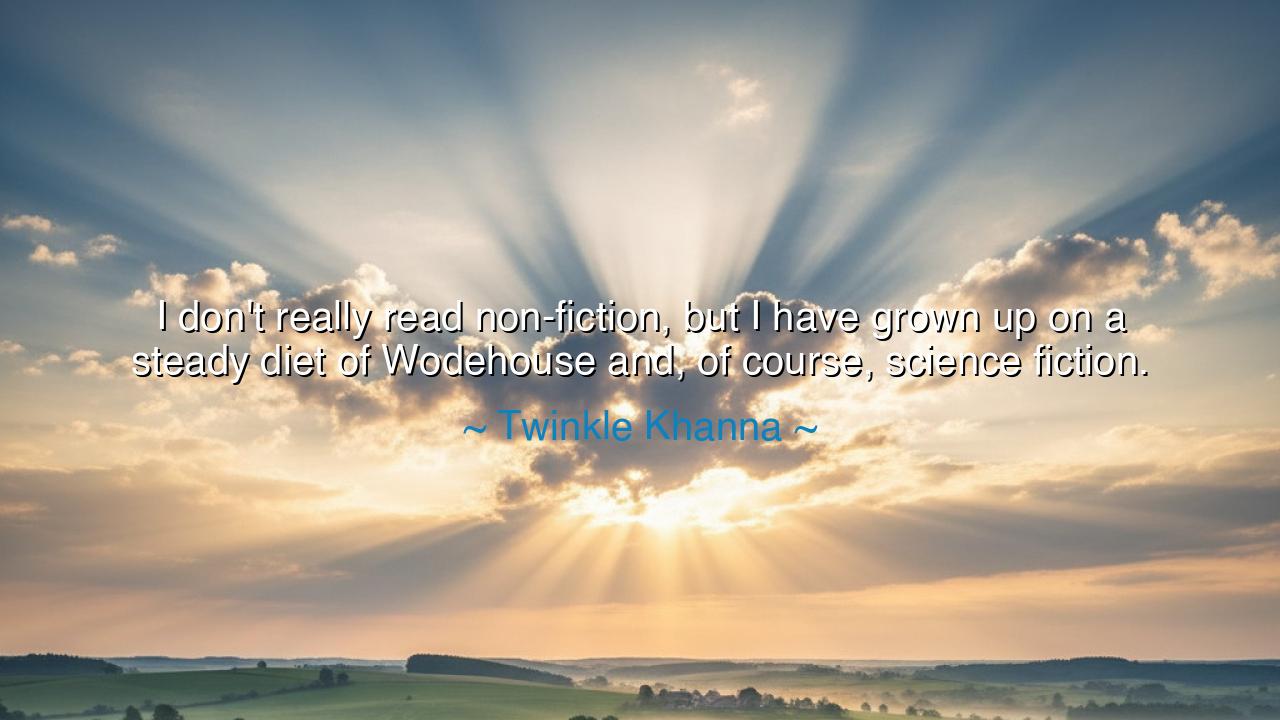
I don't really read non-fiction, but I have grown up on a steady
I don't really read non-fiction, but I have grown up on a steady diet of Wodehouse and, of course, science fiction.






In the vast ocean of knowledge, where the tides of fiction and non-fiction crash and recede, we are often faced with a choice: to dive into the depths of reality or to set sail upon the waves of imagination. Twinkle Khanna, in her candid declaration, "I don't really read non-fiction, but I have grown up on a steady diet of Wodehouse and, of course, science fiction," speaks not just of her personal preferences, but of the enduring power of the written word to shape the soul. She tells us that the foods we consume in the realm of literature are as vital as the sustenance we provide our bodies. Just as we nourish our flesh with the fruits of the earth, so too must we nourish our minds with the ideas that come from the creative and imaginative realms, for it is from these that we gain the strength to understand, challenge, and transform the world around us.
The ancient world, with its boundless wisdom, was no stranger to the power of storytelling. The great Homer, whose words have echoed through the centuries, wove tales that stretched the imagination of his listeners to the very limits of what could be believed. Through the Iliad and the Odyssey, he transported the mind to worlds where gods and mortals walked side by side, where heroes faced impossible odds, and where the very fabric of fate could be unraveled with a single stroke. Yet, Homer’s works were not merely fictional—they were profound allegories for life itself, revealing deeper truths about honor, love, and the nature of humanity. In the same way, Khanna’s love for Wodehouse and science fiction serves as a journey into the realm of possibility, a space where the mind is free to explore and envision futures beyond the horizon.
To speak of Wodehouse is to speak of a master of humor and lightness, a man who carved out a world of whimsy and wit in the face of a sometimes grim reality. His stories, filled with eccentric characters and absurd situations, remind us that there is a wisdom in laughter—a wisdom that comes from seeing the humor in life’s challenges. Wodehouse did not write to provide instruction, nor did he seek to force us to confront the harsh truths of the world. Instead, he allowed us to take flight upon the wings of imagination, to find joy in the ridiculousness of life, and in doing so, to momentarily set aside the burdens of the day. His stories were an antidote to the heaviness of existence, showing us that there is power in laughter, in lightness, and in the ability to see the world through the lens of absurdity.
Yet, Khanna also speaks of science fiction, a genre that stretches the boundaries of what is known and catapults us into the farthest reaches of possibility. Here, in the realm of science fiction, we encounter not just fanciful tales of futuristic technology, but profound reflections on human nature, society, and the very fabric of our existence. Consider the works of Isaac Asimov, whose Foundation series explored the vast intricacies of society, politics, and the laws of science. Or Arthur C. Clarke, whose visions of the future, from space exploration to the nature of artificial intelligence, continue to shape the way we think about the possibilities of tomorrow. Science fiction is not merely the realm of fantasy; it is the battleground where the mind stretches its muscles, where we confront the unknown and wrestle with the possibilities of progress and destruction alike.
This blend of Wodehouse and science fiction, which Khanna speaks of, reveals a deeper truth about the human spirit. While Wodehouse reminds us of the importance of humor, lightness, and escape, science fiction calls us to explore the unknown, to venture into the future, and to confront the fundamental questions of existence. Together, they offer a balanced diet for the soul—one that nurtures the ability to laugh and to dream, to find joy in the moment and to envision a better world. In both, we see the power of the imagination to shape not just the individual but the collective future. Through these genres, we are reminded that the greatest adventures of the mind do not lie in the facts we learn but in the possibilities we create.
Let us take Khanna’s words to heart and recognize that in the stories we read, in the fiction we consume, there is much to be learned. The imagination is not a frivolous thing, but a powerful force that shapes our understanding of the world and our place within it. By embracing the works of Wodehouse and science fiction, we allow ourselves to engage with the lightness and the depth of existence, to explore both the absurd and the profound. In doing so, we become more than mere observers of the world; we become creators of the worlds yet to be. Through fiction, we are granted the freedom to dream, to laugh, and to confront the greatest mysteries of the universe with courage and wonder.
The lesson here is clear: do not underestimate the power of fiction and imagination. In the stories we read, in the worlds we explore, we find the seeds of wisdom, insight, and understanding. We find the courage to face the unknown, the ability to laugh at the absurdities of life, and the vision to build a future that reflects our highest aspirations. As we walk through life, let us remember that the mind, like the body, requires nourishment—and sometimes, the best way to feed the soul is through the stories we choose to embrace.






AAdministratorAdministrator
Welcome, honored guests. Please leave a comment, we will respond soon